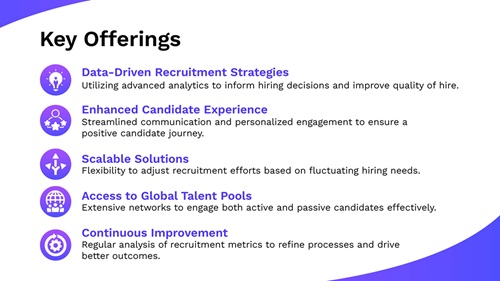Organizations today constantly struggle to attract and retain top talent. Many of us have experienced the frustration of lengthy job application processes and the unpredictability of traditional hiring methods.
These outdated approaches can leave both employers and candidates feeling lost in a sea of resumes and interviews.
As businesses strive to stand out in a competitive job market, many are turning to Recruitment Process Outsourcing services (RPO) as a smart solution. It helps companies to manage hiring without the usual headaches seamlessly. By utilizing data-driven strategies, RPO solutions enable companies to make informed hiring decisions, streamline their recruitment processes, and significantly improve the candidate experience.
Whether you're looking to streamline your processes or improve candidate experiences, understanding these elements is key to staying competitive, and this blog will help you understand them better.
Understanding RPO
RPO is a form of business process outsourcing where an organization transfers all or part of its recruitment processes to an external service provider. This partnership allows companies to leverage the expertise, technology, and data analytics capabilities of RPO providers to enhance their recruitment strategies.
The Shift to Data-Driven Hiring
Data-driven hiring represents a significant evolution in recruitment practices, where organizations harness the power of data analytics and metrics to inform their decisions. This shift is altering how companies approach talent acquisition, moving away from intuition-based methods to a more systematic and objective framework.
Many leading Fortune 500 companies, such as Deloitte, Cisco, and Google, have successfully enhanced their hiring processes and minimized errors by leveraging recruitment analytics. According to a LinkedIn poll 77% of talent professionals depend on analytics for workforce planning
By embracing data-driven recruiting, organizations can save up to 23 hours of manual labor each week through more efficient candidate pre-screening and shortlisting.
This approach is crucial for overcoming early-stage recruitment challenges, allowing companies to focus on attracting the right talent more effectively.
Why Is data-driven RPO Essential for Modern Recruitment?
Data-driven Recruitment Process Outsourcing (RPO) has emerged as a vital approach, offering numerous advantages that align with the demands of modern recruitment. Here are several reasons why data-driven RPO is essential:
1. Enhanced Decision-Making
Data-driven RPO leverages analytics to provide actionable insights into the recruitment process. By analyzing candidate data, market trends, and hiring metrics, organizations can make informed decisions that lead to better hiring outcomes. This eliminates guesswork and allows for more strategic planning.
2. Improved Candidate Quality
By using historical hiring data, RPO providers can identify the traits and qualifications that correlate with high-performing employees. This enables organizations to refine their job descriptions and candidate profiles, ensuring they attract individuals who are not only qualified but also a good cultural fit.
3. Increased Efficiency
Data-driven RPO streamlines the hiring process, significantly reducing time-to-fill positions. By employing predictive analytics, RPO can forecast hiring needs and create a proactive candidate pipeline. This means organizations can quickly respond to changing business demands without sacrificing quality.
4. Cost Savings
RPO can lead to substantial cost reductions. By analyzing recruitment metrics, companies can identify the most effective sourcing channels and allocate budgets accordingly. This strategic approach minimizes wasted resources and maximizes the return on investment for recruitment efforts.
5. Enhanced Candidate Experience
A data-driven approach helps organizations better understand candidate preferences and behaviors. By tailoring communication and engagement strategies based on this data, RPO providers can create a more positive candidate experience, which not only attracts top talent but also fosters a strong employer brand.
6. Continuous Improvement
With data at the forefront, organizations can continuously assess and refine their recruitment processes. By tracking key performance indicators (KPIs) and analyzing hiring outcomes, RPO providers can implement changes that lead to ongoing improvement, ensuring that recruitment strategies evolve alongside market trends.
7. Scalability and Flexibility
As companies grow, their hiring needs change. Data-driven RPO offers the scalability to adjust recruitment efforts based on demand. This flexibility allows organizations to respond swiftly to fluctuations in the market, ensuring they have the talent needed to achieve their goals.
What Data Should You Measure to Improve the Recruitment Process?
To enhance your recruitment process effectively, it's crucial to track specific metrics that provide valuable insights into various aspects of hiring. Here’s a breakdown of the key data points to measure, along with their importance:
1. Time-to-Fill
Analyzing time-to-fill helps you pinpoint inefficiencies in your hiring process. A lengthy duration may indicate bottlenecks in candidate screening, decision-making, or even the need for clearer job descriptions. By understanding where delays occur, you can streamline processes to fill positions more quickly without sacrificing quality. With Exela’s RPO Service you can reduce time-to-hire by 80%.
2. Quality of Hire
This metric directly impacts organizational performance. By evaluating the quality of hire, you can assess whether your recruitment strategies are effective. High-quality hires contribute to team success and lower turnover rates, which can save costs and improve overall morale. Tracking this data helps refine your hiring criteria over time.
3. Cost-per-Hire
Understanding cost-per-hire enables better budget management and resource allocation. By identifying which channels yield the best hires at the lowest cost, you can optimize spending and ensure that your recruitment investments align with business goals.
4. Candidate Source Effectiveness
Evaluating the effectiveness of various recruitment channels allows you to focus efforts on those that yield the best candidates. This insight not only improves the quality of your talent pool but also enhances efficiency by directing resources to the most productive sourcing methods.
5. Candidate Conversion Rates
Monitoring conversion rates helps identify strengths and weaknesses in your selection process. If candidates are dropping off at specific stages, it may indicate a need for process adjustments or improvements in communication, ensuring a smoother journey for applicants.
6. Offer Acceptance Rate
A low offer acceptance rate can reveal issues with your job offers, such as compensation, benefits, or candidate fit. Understanding this metric allows you to refine your offer strategies and improve the likelihood that top candidates will accept positions.
7. Diversity Metrics
Tracking diversity metrics is crucial for fostering an inclusive workplace. By assessing the demographic composition of applicants and hires, you can evaluate the effectiveness of your diversity initiatives and make informed decisions to enhance inclusivity in your recruitment practices.
8. Candidate Experience Ratings
Understanding candidate experience is vital for building a strong employer brand. Positive experiences can lead to referrals and enhance your reputation in the job market. Analyzing feedback helps identify areas for improvement, ensuring candidates feel valued throughout the process.
9. Recruitment Funnel Metrics
A clear view of your recruitment funnel helps you understand candidate movement through each stage of the hiring process. Identifying where candidates are dropping off allows you to make targeted improvements, ensuring a more efficient and effective recruitment pipeline.
10. Hiring Manager Satisfaction
Gathering feedback from hiring managers ensures that recruitment efforts align with business needs. Satisfied hiring managers are more likely to collaborate effectively with recruiters, leading to improved communication and a more streamlined hiring process.
Exela’s Services: Transforming Your Recruitment Process
Exela Technologies offers a comprehensive suite of RPO services designed to help organizations streamline their recruitment processes. By leveraging advanced analytics and a wealth of industry experience, Exela delivers tailored solutions that align with your unique hiring needs.

By partnering with Exela, organizations can transform their recruitment strategies, ensuring they attract the right talent while optimizing costs and resources. Embrace the future of recruitment with Exela's RPO solutions and take your hiring process to the next level.
The Future of Recruitment: Join Our Webinar
The integration of data-driven approaches with RPO represents the future of recruitment. To explore this topic further, we invite you to join our upcoming webinar, "The Rise of RPO: How will it affect your Business?" featuring industry experts.
In this session, you will learn:
- How to effectively implement data-driven strategies in your hiring process.
- Walk away with practical tips and tools you can implement immediately to enhance your recruitment strategy and more.
Date: 22nd Oct, Tuesday
Time: 4:00 PM IST
Register Here: https://ehrs.exelatech.com/webinar/rise-rpo-how-will-it-affect-your-business
Don’t miss this opportunity to better your recruitment strategy and stay ahead in the competitive job market.
